Darryl Jones - Interview
by Lisa Torem
published: 30 / 6 / 2013
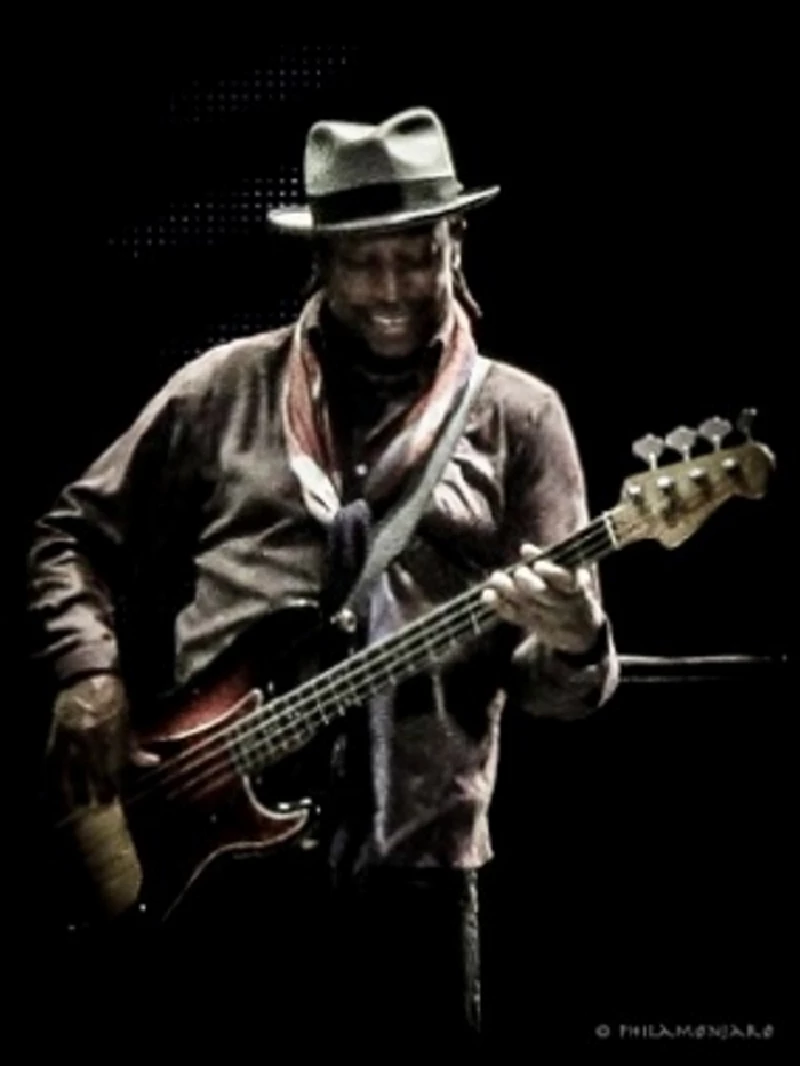
intro
Lisa Torem chats to bass player Darryl Jones about playing for both Miles Davis and the Rolling Stones
As part of the Stones '50 and Counting' tour, they performed at Chicago’s United Center for three nights. Rolling Stones bassist, Darryl Jones, participated in the 'Rolling Stones Project at a local Chicago venue, Martyrs, during that time. I said a quick hello to Darryl after he got off stage. It was already late and he had every excuse to leave and get ready for the ambitious week ahead, but he chose instead to chat with fans, pose for photos and sign autographs in front of the club for almost an hour afterwards. It is really that energy, commitment and sense of loyalty that Darryl Jones brings to the table that sets him apart from other artists. Darryl grew up on the south side of Chicago, and now lives in New York, but he still seems so very much like one of our own – a humble, hard working man who remains grateful to his early believers. His CV is astounding: Madonna, Sting, Miles Davis, the Stones and more. A versatile musician, he interprets rock and roll, the blues, jazz and funk in a personal and soulful way, but continues to work steadily at his craft, injecting great feeling into his onstage and studio work. So much of that creative spirit comes alive on 'Midnight Rambler' in front of a manic audience and on his new projects, when he thumps a thunderous bass line or growls a lyric with his newly unleashed booming baritone. Maybe it was his family’s record collection that inspired his muse. You can breathe in the ghosts of the legendary James Brown and Ron Carter in his performance, yet Darryl Jones remains, unarguably, his own man. PB: Your childhood in Chicago was a musical one – your dad, a drummer, bought you a xylophone and both of your parents exposed you to great music, but what made you choose bass as your main instrument? DJ: I saw a friend and neighbour, Angus Thomas, play in an elementary school talent show. Right then and there I decided that the next time I saw him, I would ask him to teach me to play. When I did, he asked if I wanted to learn bass guitar or lead guitar. Not knowing the difference at the time, I asked him what he played. He answered, “bass guitar.” I said, “Then I want to play the bass.” PB: Of the bass players who have inspired you, which ones were revolutionary? DJ: Jim Blanton, Ray Brown, Ron Carter, James Jamerson, Larry Graham, Stanley Clarke, Jaco Pastorius, Alphonso Johnson, Anthony Jackson and even Angus Thomas are all revolutionary players. Some because of the level at which they played the instrument functionally, and others were because they were groundbreaking in their approach to playing the bass as a lead instrument. In many cases they were revolutionary because they did both. PB: You flew to New York to audition for Miles Davis in the 1980s. How familiar were you with Miles and his repertoire prior to the audition and what did you play for him at the audition? DJ: I was exposed to Miles Davis' music from the womb, you might say. My mother and father were listening to his music before I was born and during all of my years growing up. Later, Angus, and the rest of the musicians I learned by playing along with, were listening to 'In a Silent Way', 'Bitches Brew', 'Live Evil','Agharta' etc. Pretty early in my development, they took me to jam sessions. At those sessions we were trying to play in the style of the Miles electric period. During the audition, Miles asked me to do two things. First, he asked that I play along with a recording of a live gig. He said, "You don't have to play what the bassist is playing. Play what you would play in this situation." Secondly, he asked me to play a Bb blues. Real slow. He stopped me twice and each time he said, "Slower." Afterwards, he and Vince Wilburn, who was his nephew and the friend who had recommended me to him, left the room. After a minute or two, Vince came back in and said, "You got it." I said, "I want him to tell me." Miles came into the room and lightly punched me in the arm and said, "You got it." PB: So what was it like actually playing with Miles once you got on board? DJ: Miles had the most impeccable rhythmic intuition of any musician I've ever met with the exception of maybe Tony Williams. Maybe. Miles played perfectly in time unless he was using a different "colour" from the rhythmic pallet. Miles, above all, never played without swinging. This made it easy to play with him. More than that, it made playing with him an absolute pleasure. PB: You played with Wayne Shorter on sax, Herbie Hancock onn keys, Ron Carter on bass, and Tony Williams on drums, as part of the Davis quintet. What were some of your favourite performances during that period? DJ: My favourite music from that period is from the albums 'E.S.P.', 'Miles Smiles', 'Sorcerer', 'Nefertiti', 'Miles in the Sky', 'Filles de Kilimanjaro' and 'The Complete Live At The Plugged Nickel 1965'. PB: During the five years in which you worked with Miles, you took a break and recorded with Sting, who was then moving in a different musical direction. How was it working on 'Bring on the Night'? DJ: I recorded with Sting in early 1985, and toured with him from August that year until May of the following year. Until August, I was still in Miles' band. I recorded 'You're Under Arrest' with him at that time. In August, I left Miles to tour with Sting. In October 1986, I spoke to Miles and he asked if I wanted to come back. I said, "Yes!" It was my great fortune to be taken back into Miles' band after leaving. It's a distinction few musicians have been allowed. Playing with Sting, and with those musicians: Janice Pendarvis, Dollette McDonald, Branford Marsalis, Omar Hakim and the late Kenny Kirkland was one of the best musical and personal experiences of my life. Sting wrote great music, and the band was composed of some of the finest musicians anywhere. It was immediately apparent from the first moment we played together. PB: You’ve talked at clinics about “active listening.” How challenging is it to do this when playing in a crowded, noisy arena like the United Center? Is it easier or more difficult to “actively listen” when performing in an outdoor arena like Glastonbury? DJ: Active listening is something that is, I hope, ingrained in the way I play music. It does not matter the venue. As long as I can hear the musicians around me, it's a natural default or should be. Listening is one of the most important elements in any collaborative creative endeavour. I learned that term from acting class. In the "method school" when you are listening to the dialogue of the actor or actors with whom you are performing, you are not "not acting." You must be listening in a way that supports the efforts of those in the scene and moves your character further along the arc of the story. You are actively listening. A dancer, I would imagine, must be taking in the music they are moving to even before they begin moving. This along with the choreography are the elements she is responding to, gaining inspiration from. How can she dance effectively without listening to, that is, being IN the music? PB: You’ve worked with a variety of drummers including Brian Blade and Charlie Watts. How do you adapt to different drumming styles in the studio and onstage? DJ: I adapt to drummers by listening and allowing what I hear to dictate what and how I play. PB: Do you still practice the bass even though you perform so much? DJ: I do still practice the bass. Any musician who has more to learn must. Because I have a lot more to learn, I should practice more, a lot more. PB: You replaced Stone Bill Wyman in the early 1990s. Did Bill’s work with the Stones influence you or did you consciously work out your own arrangements? DJ: I would say I am influenced by Bill Wyman's work. How can I play with the Stones and not be? I don't attempt to play like him, but there are lines he played that are important parts of the songs I play with the Stones. I'm trying to play what I feel supports the song. These lines don't need to be reinvented. It's just that my interpretation is different. PB: On the '3 Brave Souls' Project, you work with pianist John Beasley and drummer Ndugu Chancler, both past members of the Miles Davis Band. John also serves as Music Director of the Thelonious Monk Institute of Jazz. The three of you have very strong musical backgrounds. How did you come up with a singular vision for the project? DJ: John Beasley decided on the basic concept. He approached Ndugu and I about the project. We thought our shared background would provide enough influence to lead us in an interesting direction. He and Ndugu being from Louisiana and me, being from Chicago, we thought our understanding of the music of the Mississippi, i.e. blues,gospel,jazz and funk was a great jumping off point. PB: What was it like singing on this album? DJ: John mentioned we should have a few vocal tunes on the record. I told him I had an idea for a song I could sing that might be cool but I hadn't written a melody or lyrics. We recorded the music, and later he basically backed me into the corner of doing what I said I'd do. I'm glad he did. I learned a lot singing 'Stay'. I'm planning on doing more singing. I can use all the experience I can get. PB: 'Wanna Get Away?' is a really energising track. How did you work out the parts? DJ: At first, I was playing the line John plays at the opening of the song with his left hand. Later he suggested we find a complimentary bass line that worked with what he was playing. What you hear me playing on that tune is what we came up with. PB: You also play in the band, Stone Raiders, with Will Calhoun and Jean-Paul Bourelly and in the Rolling Stones Project with Tim Ries and Bernard Fowler. Which project requires more of your time and what do you see happening with both projects? DJ: The Rolling Stones Project is Tim's thing. He's an amazing saxophonist as well as a fine writer and arranger. I played on one or two songs on the record, and occasionally I do some gigs with him. Stone Raiders is a band Jean Paul, Will and I co-lead. We are exploring the indigenous music of Africa, South America, the Caribbean and North America as it relates to blues, soul, rock and roll and all of it's derivatives -what some people refer to as "roots music." We've done two tours of Europe and we're planning on another record and more touring in Europe, the US, Japan and Africa in the future. PB: On the current Stones Tour, the band played the Glastonbury Festival for the first time. Was it a positive experience? DJ: Glastonbury was a very exciting gig. The nature of the festival places several bands in front of not only their audiences but also in front of new audiences, and this makes for exciting performances. On the present tour, we've not played to audiences as large as the one at Glastonbury so that was a pleasure as well. PB: What's your favourite song from a movie and why? DJ :I love many movies and therefore many songs from many movies. Ennio Morricone recorded 'The Crave', a Jelly Roll Morton tune for the movie "The Legend Of 1900." Patti Brooks recorded the Johnny Mandel song 'Close Enough For Love' for the film 'Agatha', Burt Bacharach and Hal David wrote 'Raindrops Keep Fallin' On My Head' from 'Butch Cassidy and the Sundance Kid. Issac Hayes' 'Theme From Shaft' All the songs Curtis Mayfield recorded for 'SuperFly' Public Enemy's 'Fight the Power' for Spike Lee's film 'Do the Right Thing', Paul Simon and Art Garfunkel's 'Mrs. Robinson'" from 'The Graduate'. I could easily go on. PB: What has been most exciting about recording and touring with the Stones? DJ: All of my time with the Rolling Stones has been exciting - reat, iconic songs and lyrics. They are musicians who understand what they are doing and do it for the love of the music (not to mention having been paid handsomely for it). And,they have done it consistently for 50 plus years. Also, Stones fans are like no others. Dedicated. PB: You seem to be inspired by Japanese culture: from Soba noodles to cherry blossoms. Has touring internationally meant a lot to you? DJ: Absolutely, I think experiencing other cultures is one of the things we learn from most. Understanding how those different from us live is key in reducing the plague of xenophobia that exists in the world today. It's much easier to demonise someone you see as different. What travelling has taught me is though we all have our own customs and cultures, the things we have in common are much greater than the things that separate us. PB: With the tour wrapping up, what’s on the horizon for Darryl Jones? DJ: You asked earlier about Stone Raiders. That as well as several other projects are in the works. As to the horizon…the sky is no limit. PB: Thank you. The photographs that accompany this article were taken by Philamonjaro at www.philamonjaro.com.
Picture Gallery:-
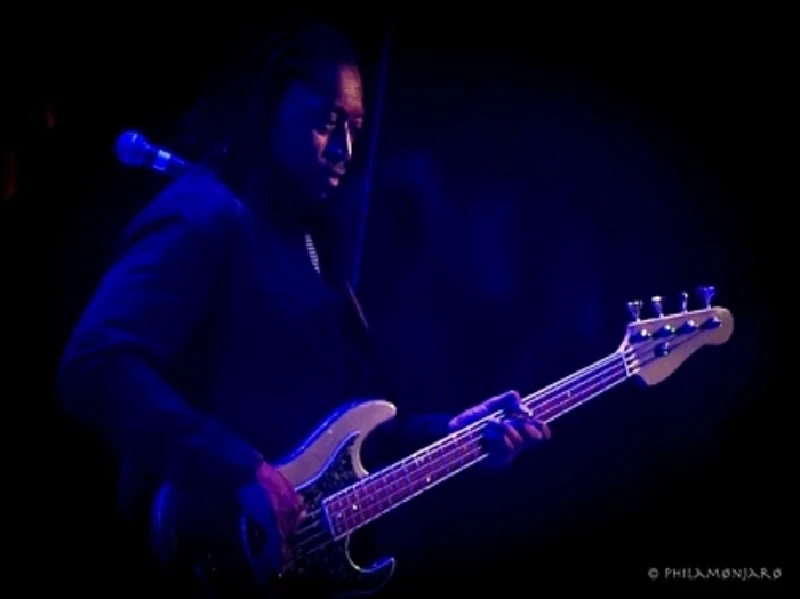
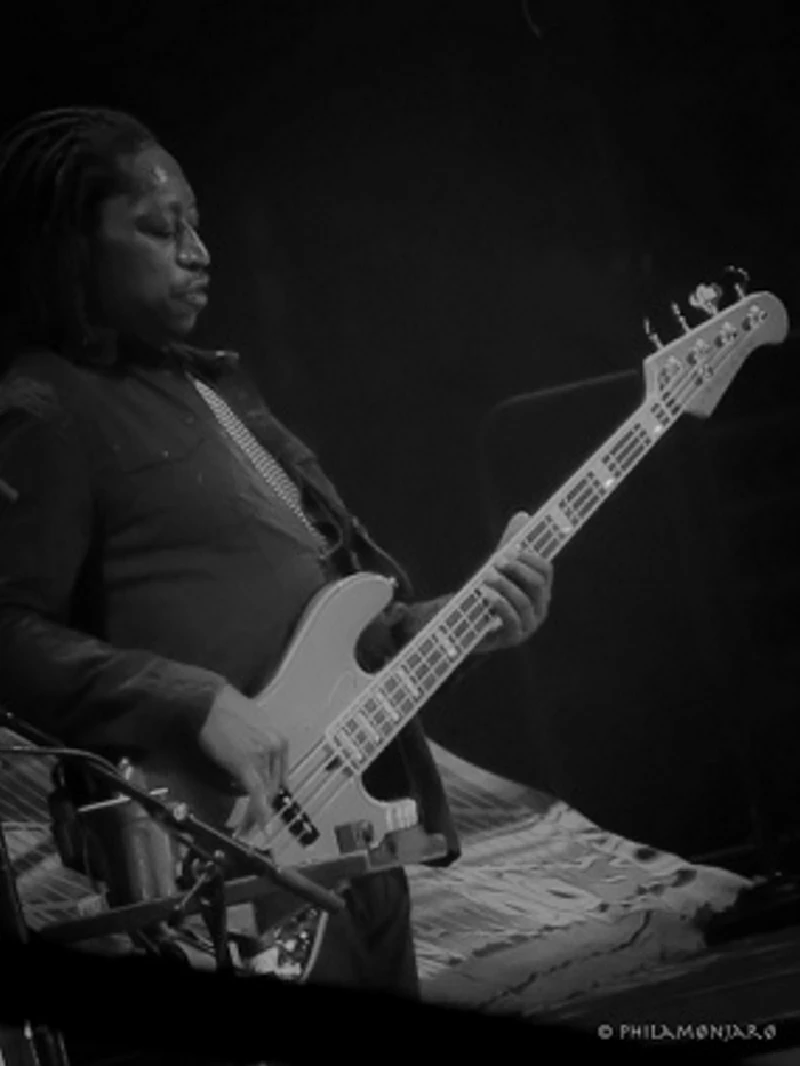
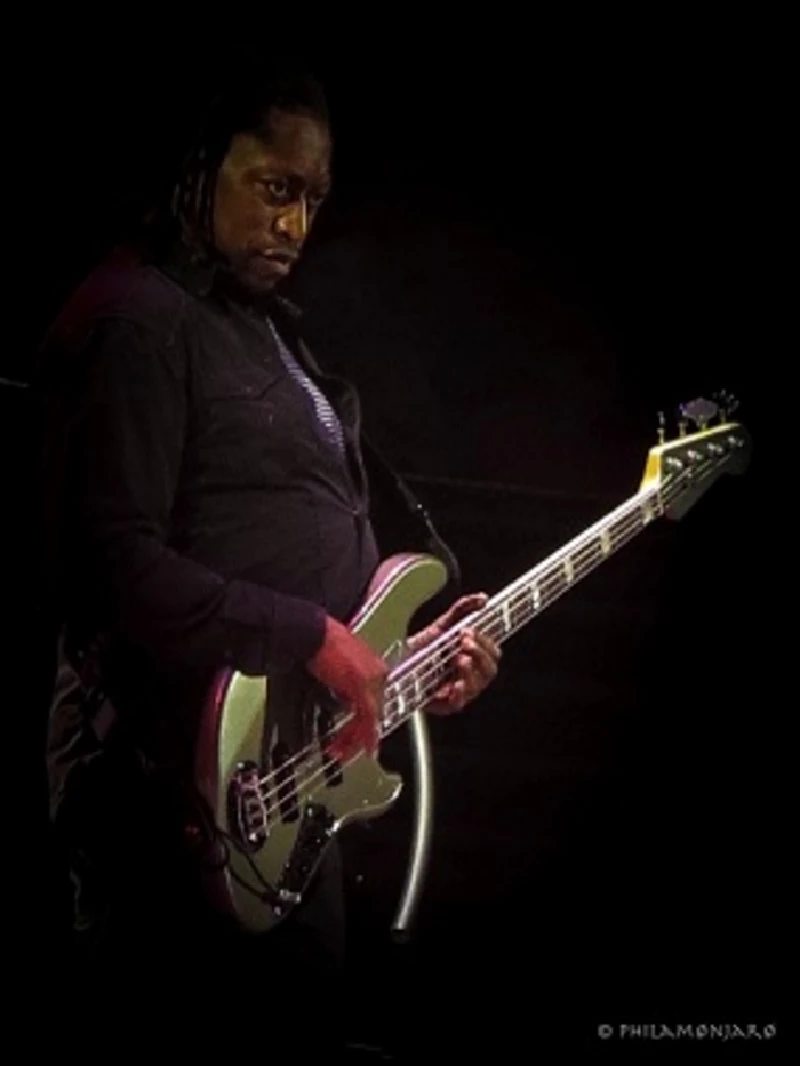
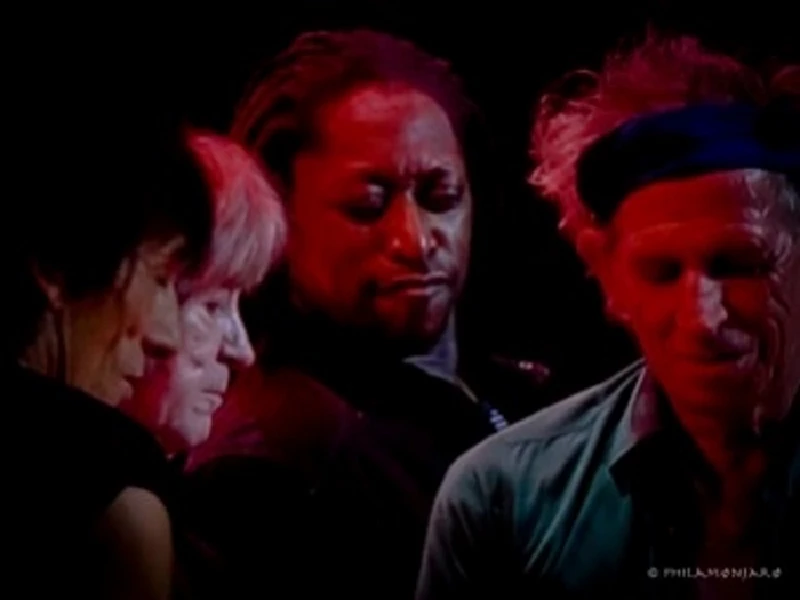
most viewed articles
current edition
Carl Ewens - David Bowie 1964 to 1982 On Track: Every Album, Every SongArmory Show - Interview with Richard Jobson
John McKay - Interview
Colin Blunstone - Thalia Hall, Chicago, 16/7/2025
Bathers - Photoscapes 1
Billie Eilish - O2 Arena, London, 10/7/2025
Loft - Interview
Visor Fest - Valencia, Spain, 26/9/2025...27/9/2025
Sir Tim Rice - Interview
Robert Forster - Interview
previous editions
Manic Street Preachers - (Gig of a Lifetime) Millennium Stadium, Cardiff, December 1999Heavenly - P.U.N.K. Girl EP
Beautiful South - Ten Songs That Made Me Love...
Peter Perrett - In Dreams Begin Responsibilities Interview Part One
Boomtown Rats - Ten Songs That Made Me Love....
Oasis - Oasis, Earl's Court, London, 1995
Coldplay - Wembley Arena. London, 16/8/2022
Prolapse - Interview
Trudie Myerscough-Harris - Interview
Pixies - Ten Songs That Made Me Love...
most viewed reviews
current edition
Davey Woodward - Mumbo in the JumboSick Man of Europe - The Sick Man of Europe
Lucy Spraggan - Other Sides of the Moon
Amy Macdonald - Is This What You've Been Waiting For?
Suzanne Vega - Flying With Angels
Blueboy - 2
Bush - I Beat Loneliness
Phew, Erika Kobayashi,, Dieter Moebius - Radium Girls
Alice Cooper - The Revenge of Alice Cooper
Cynthia Erivo - I Forgive You
Pennyblackmusic Regular Contributors
Adrian Janes
Amanda J. Window
Andrew Twambley
Anthony Dhanendran
Benjamin Howarth
Cila Warncke
Daniel Cressey
Darren Aston
Dastardly
Dave Goodwin
Denzil Watson
Dominic B. Simpson
Eoghan Lyng
Fiona Hutchings
Harry Sherriff
Helen Tipping
Jamie Rowland
John Clarkson
Julie Cruickshank
Kimberly Bright
Lisa Torem
Maarten Schiethart